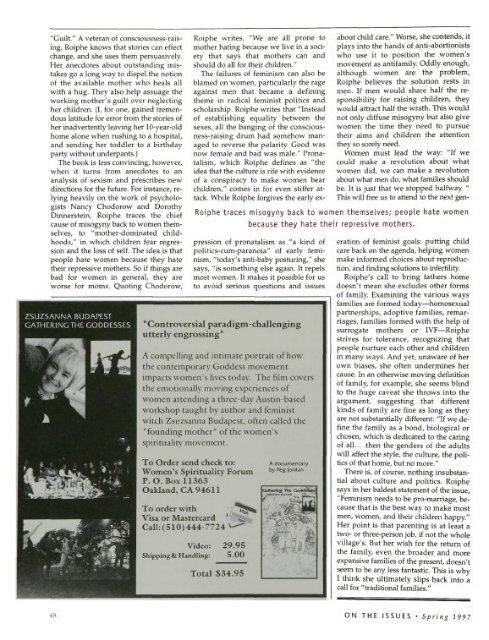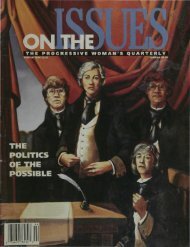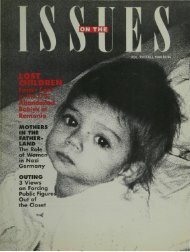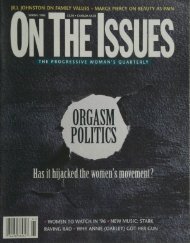I Am Beautiful: A Celebration of Women in Their Own Words
I Am Beautiful: A Celebration of Women in Their Own Words
I Am Beautiful: A Celebration of Women in Their Own Words
You also want an ePaper? Increase the reach of your titles
YUMPU automatically turns print PDFs into web optimized ePapers that Google loves.
"Guilt." A veteran <strong>of</strong> consciousness-rais<strong>in</strong>g,Roiphe knows that stories can effectchange, and she uses them persuasively.Her anecdotes about outstand<strong>in</strong>g mistakesgo a long way to dispel the notion<strong>of</strong> the available mother who heals allwith a hug. They also help assuage thework<strong>in</strong>g mother's guilt over neglect<strong>in</strong>gher children. (I, for one, ga<strong>in</strong>ed tremendouslatitude for error from the stories <strong>of</strong>her <strong>in</strong>advertently leav<strong>in</strong>g her 10-year-oldhome alone when rush<strong>in</strong>g to a hospital,and send<strong>in</strong>g her toddler to a birthdayparty without underpants.)The book is less conv<strong>in</strong>c<strong>in</strong>g, however,when it turns from anecdotes to ananalysis <strong>of</strong> sexism and prescribes newdirections for the future. For <strong>in</strong>stance, rely<strong>in</strong>gheavily on the work <strong>of</strong> psychologistsNancy Chodorow and DorothyD<strong>in</strong>nerste<strong>in</strong>, Roiphe traces the chiefcause <strong>of</strong> misogyny back to women themselves,to "mother-dom<strong>in</strong>ated childhoods,"<strong>in</strong> which children fear regressionand the loss <strong>of</strong> self. The idea is thatpeople hate women because they hatetheir repressive mothers. So if th<strong>in</strong>gs arebad for women <strong>in</strong> general, they areworse for moms. Quot<strong>in</strong>g Chodorow,Roiphe writes, "We are all prone tomother hat<strong>in</strong>g because we live <strong>in</strong> a societythat says that mothers can andshould do all for their children."The failures <strong>of</strong> fem<strong>in</strong>ism can also beblamed on women, particularly the rageaga<strong>in</strong>st men that became a def<strong>in</strong><strong>in</strong>gtheme <strong>in</strong> radical fem<strong>in</strong>ist politics andscholarship. Roiphe writes that "Instead<strong>of</strong> establish<strong>in</strong>g equality between thesexes, all the bang<strong>in</strong>g <strong>of</strong> the consciousness-rais<strong>in</strong>gdrum had somehow managedto reverse the polarity. Good wasnow female and bad was male." Pronatalism,which Roiphe def<strong>in</strong>es as "theidea that the culture is rife with evidence<strong>of</strong> a conspiracy to make women bearchildren," comes <strong>in</strong> for even stiffer attack.While Roiphe forgives the early exaboutchild care." Worse, she contends, itplays <strong>in</strong>to the hands <strong>of</strong> anti-abortionistswho use it to position the women'smovement as antifamily. Oddly enough,although women are the problem,Roiphe believes the solution rests <strong>in</strong>men. If men would share half the responsibilityfor rais<strong>in</strong>g children, theywould attract half the wrath. This wouldnot only diffuse misogyny but also givewomen the time they need to pursuetheir aims and children the attentionthey so sorely need.<strong>Women</strong> must lead the way: "If wecould make a revolution about whatwomen did, we can make a revolutionabout what men do, what families shouldbe. It is just that we stopped halfway. "This will free us to attend to the next gen-Roiphe traces misogyny back to women themselves; people hate womenbecause they hate their repressive mothers.pression <strong>of</strong> pronatalism as "a k<strong>in</strong>d <strong>of</strong>politics-cum-paranoia" <strong>of</strong> early fem<strong>in</strong>ism,"today's anti-baby postur<strong>in</strong>g," shesays, "is someth<strong>in</strong>g else aga<strong>in</strong>. It repelsmost women. It makes it possible for usto avoid serious questions and issues" Controversial paradigm-challeng<strong>in</strong>gutterly engross<strong>in</strong>g"A compell<strong>in</strong>g and <strong>in</strong>timate portrait <strong>of</strong> howthe contemporary Goddess movementimpacts women's lives today. The film coversthe emotionally mov<strong>in</strong>g experiences <strong>of</strong>women attend<strong>in</strong>g a three-day Aust<strong>in</strong>-basedworkshop taught by author and fem<strong>in</strong>istwitch Zsuzsanna Budapest, <strong>of</strong>ten called the"found<strong>in</strong>g mother" <strong>of</strong> the women'sspirituality movement.To Order send check to:<strong>Women</strong>'s Spirituality ForumP. O. Box 11363Oakland, CA 94611To order withVisa or MastercardCall: (510)444-7724Video:Shipp<strong>in</strong>g & Handl<strong>in</strong>g:Total $34.95A documentaryby Peg |ordaneration <strong>of</strong> fem<strong>in</strong>ist goals: putt<strong>in</strong>g childcare back on the agenda, help<strong>in</strong>g womenmake <strong>in</strong>formed choices about reproduction,and f<strong>in</strong>d<strong>in</strong>g solutions to <strong>in</strong>fertility.Roiphe's call to br<strong>in</strong>g fathers homedoesn't mean she excludes other forms<strong>of</strong> family. Exam<strong>in</strong><strong>in</strong>g the various waysfamilies are formed today—homosexualpartnerships, adoptive families, remarriages,families formed with the help <strong>of</strong>surrogate mothers or IVF—Roiphestrives for tolerance, recogniz<strong>in</strong>g thatpeople nurture each other and children<strong>in</strong> many ways. And yet, unaware <strong>of</strong> herown biases, she <strong>of</strong>ten underm<strong>in</strong>es hercause. In an otherwise mov<strong>in</strong>g def<strong>in</strong>ition<strong>of</strong> family, for example, she seems bl<strong>in</strong>dto the huge caveat she throws <strong>in</strong>to theargument, suggest<strong>in</strong>g that differentk<strong>in</strong>ds <strong>of</strong> family are f<strong>in</strong>e as long as theyare not substantially different: "If we def<strong>in</strong>ethe family as a bond, biological orchosen, which is dedicated to the car<strong>in</strong>g<strong>of</strong> all. . .then the genders <strong>of</strong> the adultswill affect the style, the culture, the politics<strong>of</strong> that home, but no more."There is, <strong>of</strong> course, noth<strong>in</strong>g <strong>in</strong>substantialabout culture and politics. Roiphesays <strong>in</strong> her baldest statement <strong>of</strong> the issue,"Fem<strong>in</strong>ism needs to be pro-marriage, becausethat is the best way to make mostmen, women, and their children happy."Her po<strong>in</strong>t is that parent<strong>in</strong>g is at least atwo- or three-person job, if not the wholevillage's. But her wish for the return <strong>of</strong>the family, even the broader and moreexpansive families <strong>of</strong> the present, doesn'tseem to be any less fantastic. This is whyI th<strong>in</strong>k she ultimately slips back <strong>in</strong>to acall for "traditional families."48 O N THE ISSUES • Spr<strong>in</strong>g 1997
















